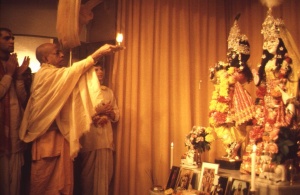SB 5.10.2: Difference between revisions
No edit summary |
(Vanibot #0054 edit - transform synonyms into clickable links, which search similar occurrences) |
||
| Line 23: | Line 23: | ||
<div class="synonyms"> | <div class="synonyms"> | ||
''yadā'' | ''[//vanipedia.org/wiki/Special:VaniSearch?s=yadā&tab=syno_o&ds=1 yadā]'' — when; ''[//vanipedia.org/wiki/Special:VaniSearch?s=hi&tab=syno_o&ds=1 hi]'' — certainly; ''[//vanipedia.org/wiki/Special:VaniSearch?s=dvija&tab=syno_o&ds=1 dvija]-[//vanipedia.org/wiki/Special:VaniSearch?s=varasya&tab=syno_o&ds=1 varasya]'' — of Jaḍa Bharata; ''[//vanipedia.org/wiki/Special:VaniSearch?s=iṣu&tab=syno_o&ds=1 iṣu]-[//vanipedia.org/wiki/Special:VaniSearch?s=mātra&tab=syno_o&ds=1 mātra]'' — the measurement of an arrow (three feet) ahead; ''[//vanipedia.org/wiki/Special:VaniSearch?s=avaloka&tab=syno_o&ds=1 avaloka]-[//vanipedia.org/wiki/Special:VaniSearch?s=anugateḥ&tab=syno_o&ds=1 anugateḥ]'' — from moving only after glancing; ''[//vanipedia.org/wiki/Special:VaniSearch?s=na&tab=syno_o&ds=1 na] [//vanipedia.org/wiki/Special:VaniSearch?s=samāhitā&tab=syno_o&ds=1 samāhitā]'' — not united; ''[//vanipedia.org/wiki/Special:VaniSearch?s=puruṣa&tab=syno_o&ds=1 puruṣa]-[//vanipedia.org/wiki/Special:VaniSearch?s=gatiḥ&tab=syno_o&ds=1 gatiḥ]'' — the movement of the carriers; ''[//vanipedia.org/wiki/Special:VaniSearch?s=tadā&tab=syno_o&ds=1 tadā]'' — at that time; ''[//vanipedia.org/wiki/Special:VaniSearch?s=viṣama&tab=syno_o&ds=1 viṣama]-[//vanipedia.org/wiki/Special:VaniSearch?s=gatām&tab=syno_o&ds=1 gatām]'' — becoming uneven; ''[//vanipedia.org/wiki/Special:VaniSearch?s=sva&tab=syno_o&ds=1 sva]-[//vanipedia.org/wiki/Special:VaniSearch?s=śibikām&tab=syno_o&ds=1 śibikām]'' — his own palanquin; ''[//vanipedia.org/wiki/Special:VaniSearch?s=rahūgaṇaḥ&tab=syno_o&ds=1 rahūgaṇaḥ]'' — King Rahūgaṇa; ''[//vanipedia.org/wiki/Special:VaniSearch?s=upadhārya&tab=syno_o&ds=1 upadhārya]'' — understanding; ''[//vanipedia.org/wiki/Special:VaniSearch?s=puruṣān&tab=syno_o&ds=1 puruṣān]'' — unto the men; ''[//vanipedia.org/wiki/Special:VaniSearch?s=adhivahataḥ&tab=syno_o&ds=1 adhivahataḥ]'' — who were carrying the palanquin; ''[//vanipedia.org/wiki/Special:VaniSearch?s=āha&tab=syno_o&ds=1 āha]'' — said; ''[//vanipedia.org/wiki/Special:VaniSearch?s=he&tab=syno_o&ds=1 he]'' — oh; ''[//vanipedia.org/wiki/Special:VaniSearch?s=voḍhāraḥ&tab=syno_o&ds=1 voḍhāraḥ]'' — carriers of the palanquin; ''[//vanipedia.org/wiki/Special:VaniSearch?s=sādhu&tab=syno_o&ds=1 sādhu] [//vanipedia.org/wiki/Special:VaniSearch?s=atikramata&tab=syno_o&ds=1 atikramata]'' — please walk evenly so that there will not be bouncing; ''[//vanipedia.org/wiki/Special:VaniSearch?s=kim&tab=syno_o&ds=1 kim] [//vanipedia.org/wiki/Special:VaniSearch?s=iti&tab=syno_o&ds=1 iti]'' — for what reason; ''[//vanipedia.org/wiki/Special:VaniSearch?s=viṣamam&tab=syno_o&ds=1 viṣamam]'' — uneven; ''[//vanipedia.org/wiki/Special:VaniSearch?s=uhyate&tab=syno_o&ds=1 uhyate]'' — is being carried; ''[//vanipedia.org/wiki/Special:VaniSearch?s=yānam&tab=syno_o&ds=1 yānam]'' — the palanquin; ''[//vanipedia.org/wiki/Special:VaniSearch?s=iti&tab=syno_o&ds=1 iti]'' — thus. | ||
</div> | </div> | ||
Latest revision as of 22:03, 18 February 2024

A.C. Bhaktivedanta Swami Prabhupada
TEXT 2
- yadā hi dvija-varasyeṣu-mātrāvalokānugater
- na samāhitā puruṣa-gatis tadā viṣama-gatāṁ sva-śibikāṁ
- rahūgaṇa upadhārya puruṣān adhivahata āha he voḍhāraḥ
- sādhv atikramata kim iti viṣamam uhyate yānam iti
SYNONYMS
yadā — when; hi — certainly; dvija-varasya — of Jaḍa Bharata; iṣu-mātra — the measurement of an arrow (three feet) ahead; avaloka-anugateḥ — from moving only after glancing; na samāhitā — not united; puruṣa-gatiḥ — the movement of the carriers; tadā — at that time; viṣama-gatām — becoming uneven; sva-śibikām — his own palanquin; rahūgaṇaḥ — King Rahūgaṇa; upadhārya — understanding; puruṣān — unto the men; adhivahataḥ — who were carrying the palanquin; āha — said; he — oh; voḍhāraḥ — carriers of the palanquin; sādhu atikramata — please walk evenly so that there will not be bouncing; kim iti — for what reason; viṣamam — uneven; uhyate — is being carried; yānam — the palanquin; iti — thus.
TRANSLATION
The palanquin, however, was very erratically carried by Jaḍa Bharata due to his sense of nonviolence. As he stepped forward, he checked before him every three feet to see whether he was about to step on ants. Consequently he could not keep pace with the other carriers. Due to this, the palanquin was shaking, and King Rahūgaṇa immediately asked the carriers, "Why are you carrying this palanquin unevenly? Better carry it properly."
PURPORT
Although Jaḍa Bharata was forced to carry the palanquin, he did not give up his sympathetic feelings toward the poor ants passing on the road. A devotee of the Lord does not forget his devotional service and other favorable activities, even when he is in a most distressful condition. Jaḍa Bharata was a qualified brāhmaṇa, highly elevated in spiritual knowledge, yet he was forced to carry the palanquin. He did not mind this, but while walking on the road, he could not forget his duty to avoid killing even an ant. A Vaiṣṇava is never envious or unnecessarily violent. There were many ants on the path, but Jaḍa Bharata took care by looking ahead three feet. When the ants were no longer in his way, he would place his foot on the ground. A Vaiṣṇava is always very kind at heart to all living entities. In His sāṅkhya-yoga, Lord Kapiladeva explains: suhṛdaḥ sarva-dehinām (SB 3.25.21). Living entities assume different bodily forms. Those who are not Vaiṣṇavas consider only human society worthy of their sympathy, but Kṛṣṇa claims to be the supreme father of all life forms. Consequently the Vaiṣṇava takes care not to annihilate untimely or unnecessarily any life form. All living entities have to fulfill a certain duration for being encaged in a particular type of material body. They have to finish the duration allotted a particular body before being promoted or evolved to another body. Killing an animal or any other living being simply places an impediment in the way of his completing his term of imprisonment in a certain body. One should therefore not kill bodies for one's sense gratification, for this will implicate one in sinful activity.